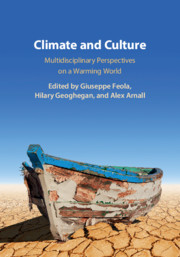Description
Climate and Culture
Multidisciplinary Perspectives on a Warming World
Coordinators: Feola Giuseppe, Geoghegan Hilary, Arnall Alex
Discusses how culture both facilitates and inhibits our ability to address, live with, and make sense of climate change.
Language: English
Subject for Climate and Culture:
Publication date: 10-2019
348 p. · 17.8x25.4 cm · Hardback
348 p. · 17.8x25.4 cm · Hardback
Description
/li>Contents
/li>Biography
/li>
How does culture interact with the way societies understand, live with, and act in relation to climate change? While the importance of the exchanges between culture, society and climate in the context of global environmental change is increasingly recognised, the empirical evidence is fragmented and too often constrained by disciplinary boundaries. Written by an international team of experts, this book provides cutting-edge and critical perspectives on how culture both facilitates and inhibits our ability to address and make sense of climate change and the challenges it poses to societies globally. Through a set of case studies spanning the social sciences and humanities, it explores the role of culture in relation to climate and its changes at different temporal and spatial levels; illustrates how approaching climate change through the cultural dimension enriches the range and depth of societal engagements; and establishes connections between theory and practice, which can stimulate action-oriented initiatives.
Foreword; 1. Climate and culture: taking stock and moving forward Hilary Geoghegan, Giuseppe Feola and Alex Arnall; 2. Cultures of prediction in climate science Martin Mahony, Gabriele Gramelsberger and Matthias Heymann; 3. Visualising climate and climate change: a longue durée perspective Sebastian Vincent Grevsmühl; 4. Indigenous knowledge regarding climate in Colombia: articulations and complementarities among different knowledges Astrid Ulloa; 5. Thin place: new modes of environmental knowing through contemporary curatorial practice Ciara Healy; 6. Multi-temporal adaptations to change in the Central Andes Julio C. Postigo; 7. Not for the faint of heart: tasks of climate change communication in the context of societal transformation Susanne C. Moser; 8. At the frontline or very close: living with climate change on St Lawrence Island, Alaska, 1999–2017 Igor Krupnik; 9. Localising and historicising climate change: extreme weather histories in the United Kingdom Georgina Endfield and Lucy Veale; 10. From denial to resistance: how emotions and culture shape our responses to climate change Allison Ford and Kari Marie Norgaard; 11. Effective responses to climate change – some wisdom from the Buddhist worldview Peter Daniels; 12. Creating a culture for transformation Karen O'Brien, Gail Hochachka and Irmelin Gram-Hanssen; 13. Back to the future? Satoyama and cultures of transition and sustainability John Clammer; 14. Culture and climate change: experiments and improvisations – an afterword Renata Tyszczuk and Joe Smith; Index.
Giuseppe Feola is Assistant Professor of Social Change for Sustainability at Universiteit Utrecht, The Netherlands, and a Visiting Fellow at the School of Archaeology, Geography and Environmental Science at the University of Reading. His research engages with issues of sustainability, resilience and transformation of agricultural systems, sustainability transitions and post-capitalist transformations, and social change theories. Feola is the recipient of a Starting Grant from the European Research Council and a VidiI Grant from the Netherlands Research Organization.
Hilary Geoghegan is Associate Professor in Human Geography at the University of Reading. Geoghegan researches at the intersection of the social and natural sciences and explores the emotional and affective relations between people and the material world. Using the geographical concept of landscape, she has worked on the human geographies of climate change. Hilary is currently examining the social and more-than-human dimensions of forest management which result from climate change-induced movement of pests and diseases.
Alex Arnall is Associate Professor in Environment and Development at the University of Reading. He specialises in the study of migration, movement and displacement of people and things. His work is characterised by an environmental theme, including climate change, agricultural development and food systems. Much of Alex's empirical research has taken place in the Maldives and Mozambique. Arnall's research has been funded by the Economic and Social Research Council, Department for International Development, British Academy, and Norwegian Research Council.
Hilary Geoghegan is Associate Professor in Human Geography at the University of Reading. Geoghegan researches at the intersection of the social and natural sciences and explores the emotional and affective relations between people and the material world. Using the geographical concept of landscape, she has worked on the human geographies of climate change. Hilary is currently examining the social and more-than-human dimensions of forest management which result from climate change-induced movement of pests and diseases.
Alex Arnall is Associate Professor in Environment and Development at the University of Reading. He specialises in the study of migration, movement and displacement of people and things. His work is characterised by an environmental theme, including climate change, agricultural development and food systems. Much of Alex's empirical research has taken place in the Maldives and Mozambique. Arnall's research has been funded by the Economic and Social Research Council, Department for International Development, British Academy, and Norwegian Research Council.
© 2024 LAVOISIER S.A.S.

